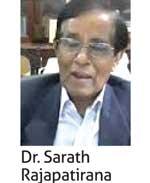Reply To:
Name - Reply Comment
By Shabiya Ali Ahlam
The economic recovery of Sri Lanka requires the government to take a fresh look at its policies; however, the urgent need is to increase its participation in international trade, for which it is imperative to redefine the current tariff structure, said senior economist Dr. Sarath Rajapatirana.
 As the national economy continues to face new challenges from multiple angles and their implications are being very much felt by businesses and masses, Dr. Rajapatirana called for the government to start by having in place a more streamlined tariff structure.
As the national economy continues to face new challenges from multiple angles and their implications are being very much felt by businesses and masses, Dr. Rajapatirana called for the government to start by having in place a more streamlined tariff structure.
“First get rid of para tariffs fast. And then look to introduce a single uniform tariff,” asserted Dr. Rajapatirana while addressing a webinar hosted by the Advocata Institute, this week.
For Sri Lanka to embark on any efforts that would assist in the recovery of the national economy, Dr. Rajapatirana stressed it is essential for the relevant authorities to acknowledge the importance of international trade when charting the path for progress.
He pointed out that Sri Lanka needs to get away from its protectionist mindset and the way to get about it is to first look at lowering the existing tariff.
“The existing para tariff hurts our competitiveness. This is one of the fundamental things we need to do,” said Dr. Rajapatirana.
He added that the government must also explore the option of introducing a uniform tariff of about 15 percent, which can be reduced over a period of time.
Dr. Rajapatirana opined that by bringing about the suggested changes, Sri Lanka would be signalling to the world that it is serious in wanting to achieve economic progress.
Dr. Rajapatirana also pointed out that the country has not made any substantial economic reforms, especially on the trade side, in the last 20 years or so.
As the country continues to grapple with the COVID-19 pandemic along with the rest of the world, Dr. Rajapatirana warned that neglecting the economy would only further delay the recovery process.
“We cannot think of economic recovery without really starting trade reforms. We are in a good driving seat to undertake the reforms since the government has two-thirds majority.
We need to have the macrocosmic reforms that come from the monetary policy and the fiscal policy. Without that you don’t have the sort of dynamic stability that is needed to put in place a good reform programme,” he said.